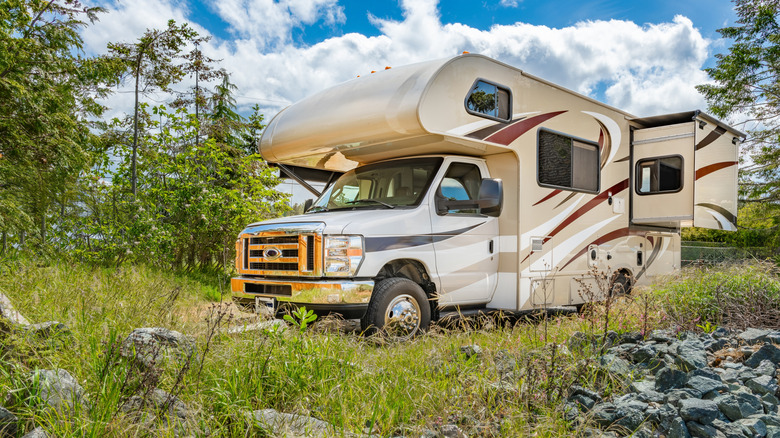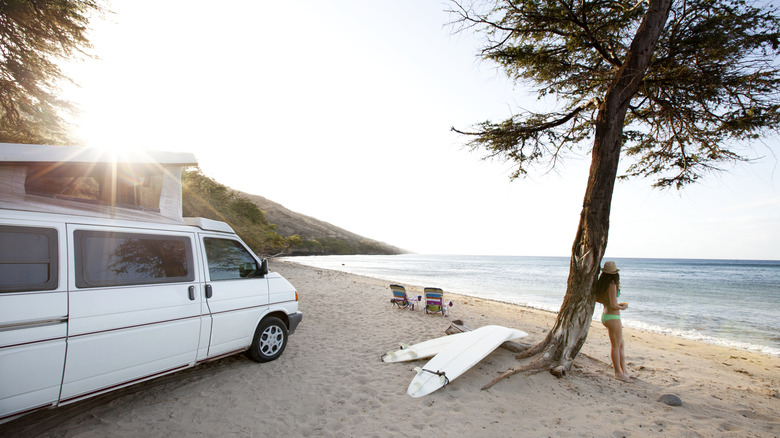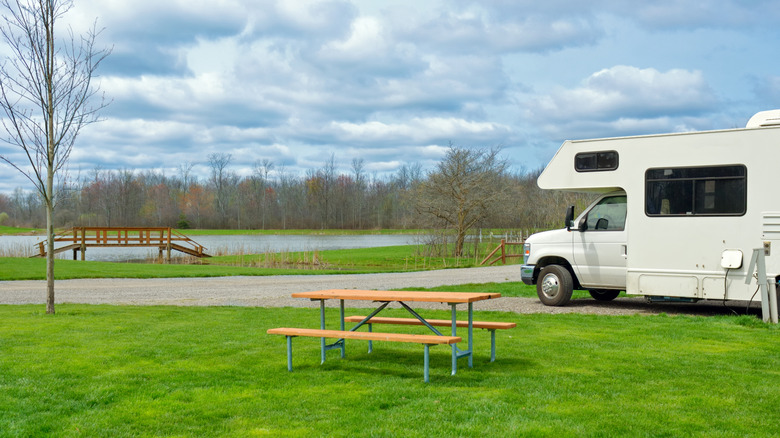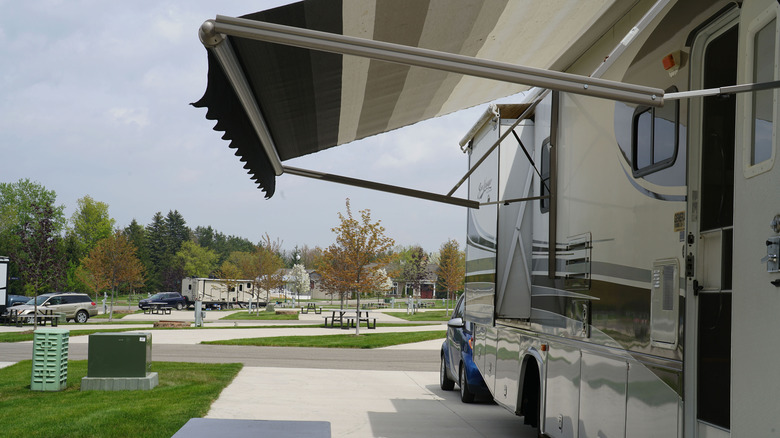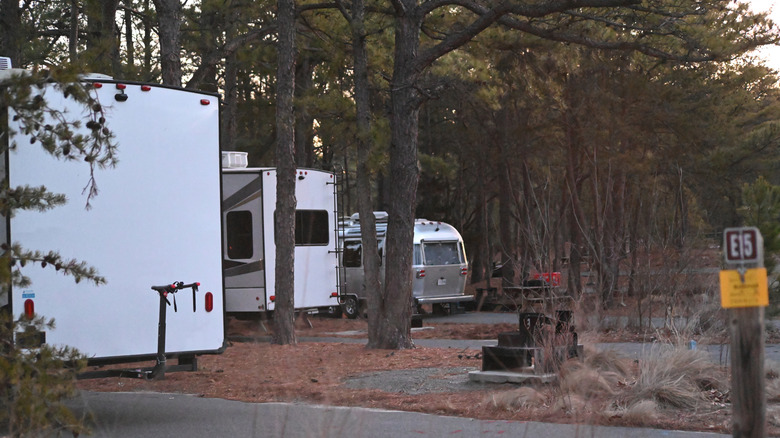U.S. States That Made It Illegal To Live Out Of Your RV
You might be inclined to think that if you buy a piece of property, you can do whatever you want on that property (short of commit a crime). Leave the land empty except for a single, iron peg for a game of horseshoes? Sure. Strap a cattle skull on your head and dance wildly under the full moon? Sure. But live on that property in an RV? No can do in four U.S. states: Indiana, Michigan, Hawaii, and Delaware. That is, not without some serious caveats that make it impractical to the point of impossible.
To clarify, when we say "live out of" your RV, we mean treating your RV as a permanent, full-time residence on your own, private property — like a tiny house on wheels. Some U.S. states are comparatively lax about living out of RVs, like Texas, provided you register your vehicle. In Alaska, meanwhile, it might be legal but dangerous to do so because of the cold. And even then, individual cities like Anchorage don't allow it unless your main residence is undergoing renovation (and even then, not across the whole city). RV laws are generally like this. They're tangled messes of ordinances and exceptions to rules.
Then there are the four strictest states. In Hawaii, living in an RV in one spot is technically illegal but you can constantly move between campgrounds. Same goes for Michigan and also Indiana, the latter of which restricts use of a given campground to 14 days in a row. Delaware might be the strictest of them all, though, as they combine all of the above with limited RV camping options.
Hawaii has strangely strict RV and camping laws
"No person shall use any vehicle for purposes of human habitation," § 291C-112 of Hawaii's law code bluntly reads (per Find Law). This statute makes it perfectly clear that an RV is a vehicle, and folks can't live in vehicles — that's it. Even if your RV is parked on your own private property, you're not even allowed to sleep in it. This might seem strange for a state like Hawaii, where it seems folks ought to have the option of living a carefree, unburdened beachside life fueled by wanderlust, sunshine, and fish tacos. Also, Hawaii is the most expensive state in the United States to live, so an RV home could definitely help some people out. And judging by discussions on sites like Facebook, quite a few people have considered this option.
The closest that someone can get to living out of their RV on Hawaii is to continually move between campgrounds, which is a tremendous hassle and will quickly get prohibitively expensive. And if you want to move between islands, you've got use inter-island car shipping. But even then — and strangely for a nature-rich place like Hawaii — the state has limited camping options.
HipCamp is an easy way to book RV camping spots around Hawaii, particularly on Honolulu and Hawaii (the Big Island), and functions much like booking short-term, nightly lodging. Haleakalā National Park and Hawai'i Volcanoes National Park allow vehicle camping, with the former requiring reservation and a maximum of three days, and the latter no reservation but a maximum of seven days. The stunning and inviting Wai'ānapanapa State Park allows RV camping, too, at a per night rate and provided the vehicle is an authorized type.
Indiana has vague, but ultimately limiting rules about recreational vehicles
Laws against living in RVs are far more vague in Indiana than in Hawaii, but the result is the same: no can do. Rather than say outright that RV living is illegal, Indiana law implies it through a series of statutes centered on the difference between temporary and/or recreational vehicles and a permanent residence. Per Justia, Indiana Code § 9-13-2-150 defines a "recreational vehicle" as a commonly described "park model RV" that is "designed and marketed as temporary living quarters." This means that it's not a permanent residence, as Indiana-based defense lawyers Shure and Associates clarifies. And why would lawyers be clarifying this? We wouldn't try breaking Indiana RV-related laws to find out.
We can look at Jefferson County laws as a specific example, a county saturated in forests and parks with Clifty State Park at the center. Jefferson County mentions the same "recreational vehicle" designation, and says that such vehicles don't comply with the standards laid out by the U.S. Department of Housing and Urban Development (HUD). Campground RV camping is okay, though, provided the park meets Indiana State Department of Health (ISDH) standards, has appropriate sewage disposal and utility connections, and the camper vacates after 14 days. On Find Law, Indiana statute § 16-41-27.5-5 relatedly defines an "RV campsite" as usable expressly for vacation, business, tourist, etc., purposes, but not for permanent residence.
Thankfully, RV camping is still an option in Indiana. HipCamp once again comes to the rescue to streamline RV camping booking in Indiana. Some state parks, like Ouabache State Park, have easily bookable vehicle camping options, complete with a mini-parking map. Ouabache State Park also affords visitors the unique opportunity to go bison viewing.
RVs aren't classified as permanent residences in Michigan
Few cases could illustrate the labrynthine, brain-melting complexities underpinning RV laws than 2016's Vansteenhouse v. Winslow in Michigan. Explained in full on Hirzel Law, PLC, the case determined that the presence of a camper on private property did not violate legal codes regarding home deeds because campers, RVs, and trailers are motor vehicles "not designed for permanent use." This is true no matter that they are roughly box-shaped, like a house. The long, circuitous route to this conclusion involved the Michigan Court of Appeals citing 1943 precedent that determined that a camper didn't constitute, "usual, ordinary and incidental use of property as a place of abode."
And what does this mean for RV users? Ultimately, it means that an RV is classifiable as a motor home, "designed to provide temporary living quarters for recreational, camping, or travel use," per Michigan law code § 333.12501 on Find Law. You can't live in RVs in Michigan because, similar to Indiana, RVs aren't legally permanent residences.
Like before, however, folks can still camp in their RVs around Michigan and simulate living out of their RV. Michigan State Park & Harbor Reservations has a surprisingly robust search engine that sifts through Michigan's copious parks to find RV camping, both on the Upper and Lower Peninsulas. Tahquamenon Falls State Park and its multiple "root beer" waterfalls has slots with 50-amp RV connections, as does Ludington State Park, a coastal park along Lake Michigan with numerous camping grounds.
Delware has tight RV laws and minimal RV camping space
Finally, we come to a small Atlantic seaboard state with a population of about 1 million and possibly the most restrictive RV laws of all: Delaware. Much like Indiana and Michigan, Delaware's anti-RV living laws boil down to definitions of vehicles vs. residences rather than a direct, "Don't live in your car" statute like Hawaii. Delaware law code Title 21, Motor Vehicles § 8402 defines a motor home not as a residence, but a place, "designed to provide temporary living quarters for recreational, camping, or travel use" (per Find Law). To top if off, the Delware Law Code even has some ultra-precise parking laws that add to the difficulties, like needing to park within 12 inches of a curb or further than 20 feet from a crosswalk.
On top of this, Delaware only has five state parks available for RV use: Cape Henlopen Park, Delaware Seashore, Killens Pond, Lums Pond, and Trap Pond. Otherwise, you've got to go to Dingman's Camping Ground at Delaware Water Gap (a National Recreation Area) and that a mere 16 spots available. Thankfully, there are some other private RV camping spots available to book on sites like HipCamp, otherwise RV owners in Delaware would have a hard time even finding spots to spend overnight. But living on a constant rotation of camping grounds in Delaware on a never ending roadtrip to try and circumvent its RV laws? Not a good idea. But at least visitors can drive around in their RV and visit some of Delaware's other notable places and parks, including First State National Park. This historical park gets its name from Delaware's status as the first state in the U.S.
